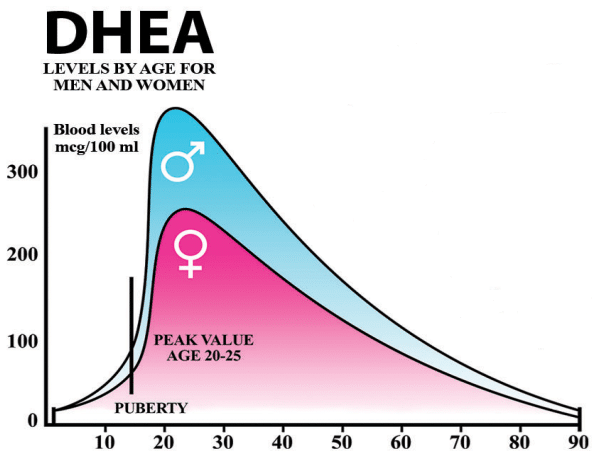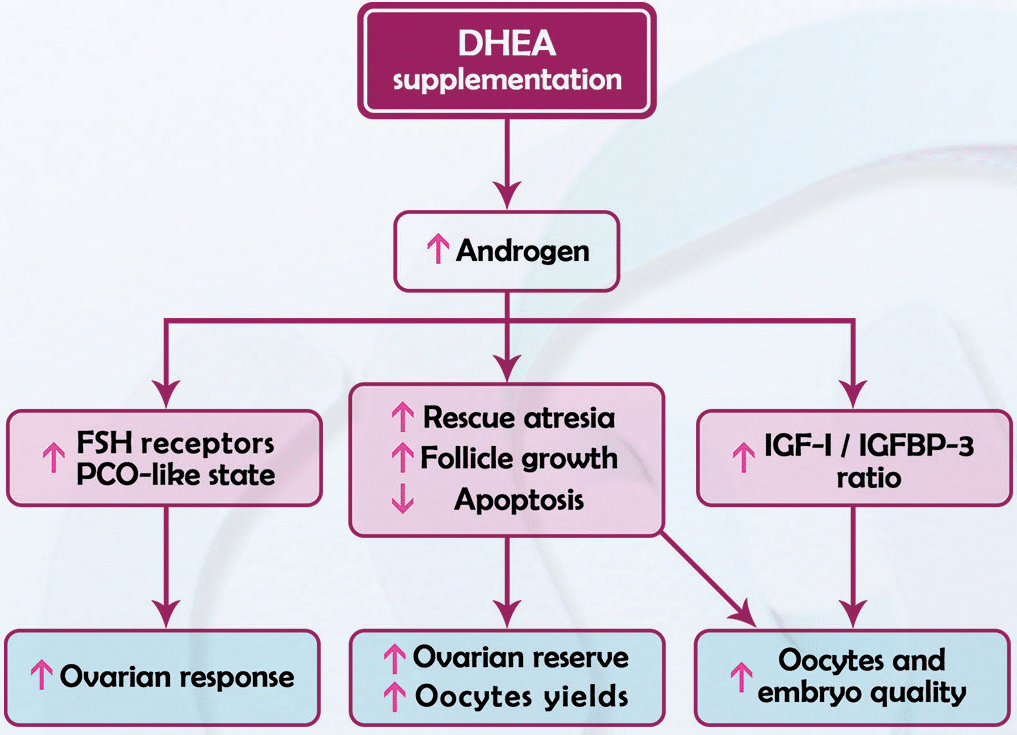DHEA
What is DHEA?
Dehydroepiandrosterone (DHEA) is a steroid compound produced in the adrenal and gonads glands. This compound is the precursor of other hormones, specifically estrogen and testosterone. Its amount in the body is at the highest level in early youth and decreases with age. DHEA-S or DHEA sulfate is also a derivative of DHEA that turns into the androgen hormone in the body.
- Dosage form: Tablet
- Strength: 25 mg
- packaging: 60 tablets in a bottle
- Type: Supplement

Dehydroepiandrosterone (DHEA) is a natural steroid compound that is produced in the adrenal gland and gonads. This compound is the precursor of other hormones, mainly estrogen and testosterone. During early youth, its levels are highest and decrease with age. So that it reaches 50% at the age of 40, 10-20% at the age of 65, and 5% at the age of 80.

Indications and benefits of use:
DHEA supplementation may improve various aspects of sexual function, including sexual desire and fertility in women. During an experiment conducted on women with infertility problems, it was found that by taking DHEA supplements, more ovules are produced and a higher percentage of ovules are fertile. (67% vs. 39% before taking DHEA supplement). In addition, several studies have shown that this supplement can increase sexual desire and improve sexual performance in men and women.
- increasing sexual power and fertility:
DHEA supplementation may improve various aspects of sexual function, including sexual desire and fertility in women. During an experiment conducted on women with infertility problems, it was found that by taking DHEA supplements, more ovules are produced and a higher percentage of ovules are fertile. (67% vs. 39% before taking DHEA supplement). In addition, several studies have shown that this supplement can increase sexual desire and improve sexual performance in men and women.
- Preventing osteoporosis:
Increasing the number of osteoblasts (bone-forming cells) and preventing their death, DHEA facilitates the development of bone mass and increases bone volume and mineral density. Having these properties can also prevent osteoporosis after menopause. A study of South Korean men found that DHEA has the same positive effects on bone mass and helps prevent osteoporosis in men.
- Improving mood and brain function:
Several studies have shown the effectiveness of DHEA supplementation on memory performance. For example, in postmenopausal women, taking 50 mg of DHEA daily has improved memory. Several studies observed that the disease’s symptoms in people with major depression improved with the use of DHEA.
- Heart protection:
Low levels of DHEA in men are associated with heart disease. In a study, it was found that the possibility of death due to heart disease in healthy men with low DHEA levels is higher than in normal people.
- Reducing the symptoms of autoimmune diseases and inflammation:
Low levels of DHEA have also been observed in patients with autoimmune disorders (such as diffuse lupus, rheumatoid arthritis, sclerosis, colitis). Taking DHEA supplements improves the general condition of patients with autoimmune disorders. Especially in the case of patients with lupus, taking DHEA supplements eliminates the inflammation caused by intestinal diseases and restores the normal length of the colon.
Mechanism of action of DHEA supplement:

DHEA dosage:
The National Institute of Health in the United States has considered the consumption of 20 to 50 mg of DHEA supplement per day to be sufficient and safe for most adults over the age of thirty. Regarding the time frame, a dose of 50 mg/day can be used for one year, and a dose of 25 mg/day can be safely used for two years. DHEA supplementation has generally been studied for up to two years without causing severe side effects.
Depending on the reason for use, the duration of use may also vary, for example, for depression, 30 to 450 mg daily for 6 weeks, and for infertility problems, 75 mg for 3 months before IVF.
Possible interactions with DHEA supplementation:
Pregnant and breast-feeding women as well as children should avoid using this product.
Do not use if you have a previous or family history of hormone-sensitive cancers (such as breast, ovarian or prostate cancer).
Consult a healthcare provider prior to use if you have any medical condition such as diabetes, heart disease, liver dysfunction and polycystic ovary syndrome.
Do not exceed the recommended dose. If taken in high doses or for a long period of time in women, it may increase testosterone and cause acne and hirsutism.
Keep in a dry place, below 25° C, out of reach of children.
References:
mayoclinic.org
Webmd.com
healthline.com
rxlist.com

